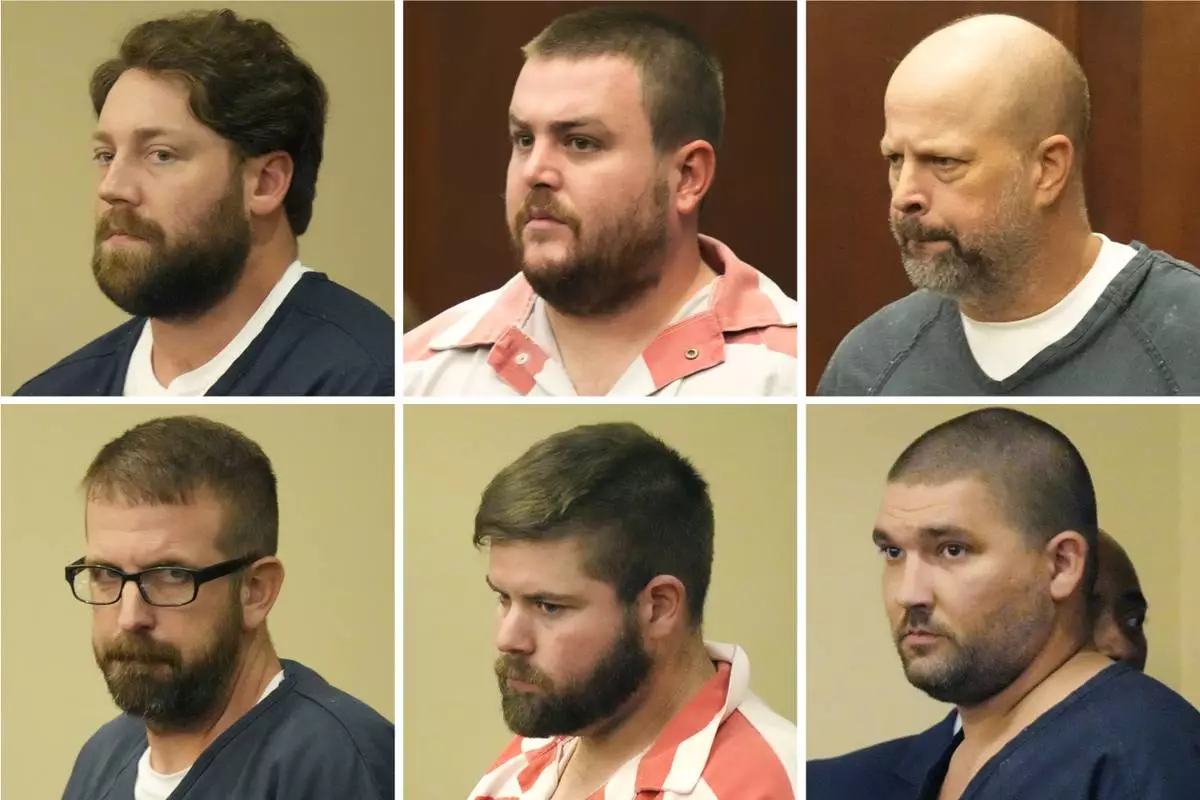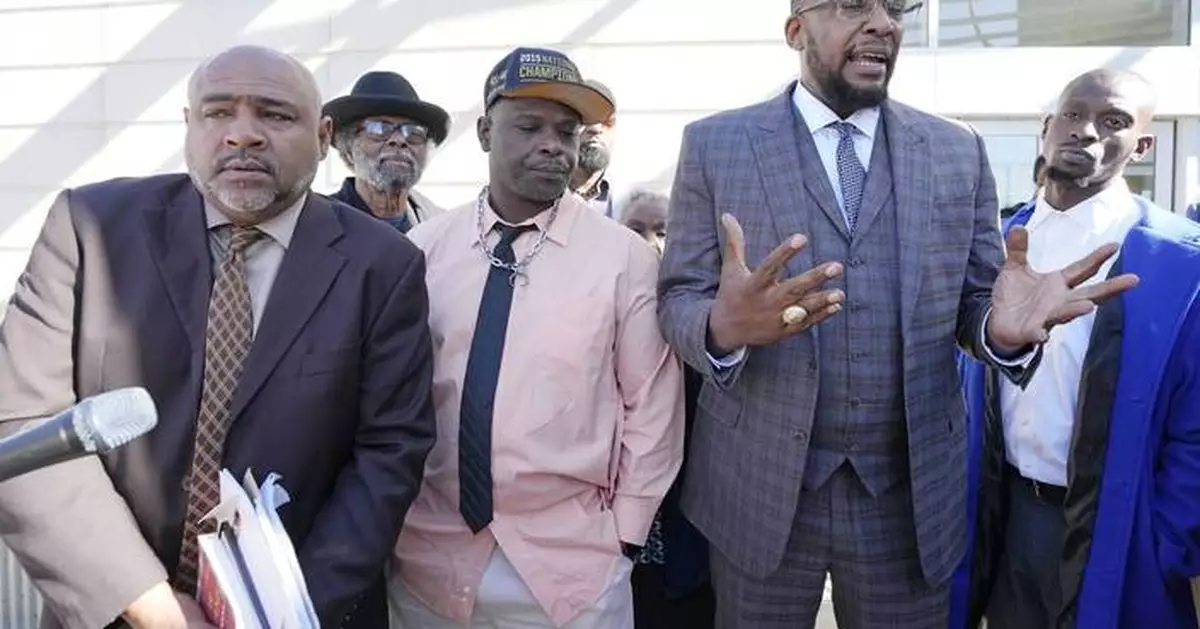JACKSON, Miss. (AP) — Attorneys for two Black men who were tortured by Mississippi law enforcement officers said Monday that they expect to file more lawsuits on behalf of other people who say they were brutalized by officers from the same sheriff's department.
The Justice Department said Thursday that it was opening a civil rights investigation into the Rankin County Sheriff's Department. The announcement came months after five former Rankin County deputies and one Richland former police officer were sentenced on federal criminal charges in the racist attack that included beatings, repeated use of stun guns and assaults with a sex toy before one victim was shot in the mouth.
Attorneys Malik Shabazz and Trent Walker sued the Rankin County Sheriff's Department last year on behalf of the two victims, Michael Corey Jenkins and Eddie Terrell Parker. The suit is still pending and seeks $400 million.
“We stand by our convictions that the Rankin County Sheriff's Department over the last decade or more has been one of the worst-run sheriff's departments in the country, and that's why the Department of Justice is going forth and more revelations are forthcoming," Shabazz said during a news conference Monday. "More lawsuits are forthcoming. The fight for justice continues.”
Shabazz and Walker have called on Sheriff Bryan Bailey to resign, as have some local residents.
The two attorneys said Monday that county supervisors should censure Bailey. They also said they think brutality in the department started before Bailey became sheriff in 2012. And they said Rankin County's insurance coverage of $2.5 million a year falls far short of what the county should pay to victims of brutality.
“There needs to be an acknowledgement on the part of the sheriff's department, on the part of Bailey and the part of the county that allowing these officers and this department to run roughshod for as long as it did had a negative toll on the citizens of the county,” Walker said.
The Justice Department will investigate whether the Rankin County Sheriff’s Department has engaged in a pattern or practice of excessive force and unlawful stops, searches and arrests, and whether it has used racially discriminatory policing practices, Assistant Attorney General Kristen Clarke said last week.
The sheriff's department said it will fully cooperate with the federal investigation and that it has increased transparency by posting its policies and procedures online.
The five former deputies and former police officer pleaded guilty in 2023 to breaking into a home without a warrant and engaging in an hourslong attack on Jenkins and Parker. Some of the officers were part of a group so willing to use excessive force they called themselves the Goon Squad. All six were sentenced in March, receiving terms of 10 to 40 years.
The charges followed an Associated Press investigation in March 2023 that linked some of the officers to at least four violent encounters since 2019 that left two Black men dead.
The Justice Department has received information about other troubling incidents, including deputies overusing stun guns, entering homes unlawfully, using “shocking racial slurs” and employing “dangerous, cruel tactics to assault people in their custody,” Clarke said.
The attacks on Jenkins and Parker began on Jan. 24, 2023, with a racist call for extrajudicial violence, according to federal prosecutors. A white person phoned Deputy Brett McAlpin and complained that two Black men were staying with a white woman at a house in Braxton.
Once inside the home, the officers handcuffed Jenkins and Parker and poured milk, alcohol and chocolate syrup over their faces while mocking them with racial slurs. They forced them to strip naked and shower together to conceal the mess. They mocked the victims with racial slurs and assaulted them with sex objects.
In addition to McAlpin, the others convicted were former deputies Christian Dedmon, Hunter Elward, Jeffrey Middleton and Daniel Opdyke and former Richland police officer Joshua Hartfield.
Locals saw in the grisly details of the case echoes of Mississippi’s history of racist atrocities by people in authority. The difference this time is that those who abused their power paid a steep price for their crimes, attorneys for the victims have said.
Associated Press writer Michael Goldberg contributed.

FILE - This combination of photos shows former Mississippi law enforcement officers who pleaded guilty to state and federal charges for torturing two Black men, from top left, former Rankin County sheriff’s deputies Hunter Elward, Christian Dedmon, Brett McAlpin, Jeffrey Middleton, Daniel Opdyke and former Richland police officer Joshua Hartfield, during court appearances Monday, Aug. 14, 2023, in Brandon, Miss. (AP Photo/Rogelio V. Solis, File)

FILE - Lead civil attorney Malik Shabazz, second from right, speaks to reporters while his clients, Michael Corey Jenkins, right, and Eddie Terrell Parker, second from left, stand with their local attorney Trent Walker, outside the federal courthouse in Jackson, Miss., Tuesday, March 19, 2024, following the sentencing of the second of six former Mississippi Rankin County law enforcement officers who committed numerous acts of racially motivated, violent torture on Parker and Jenkins in 2023. (AP Photo/Rogelio V. Solis, File)
BOULDER, Colo. (AP) — A mentally ill man who killed 10 people at a Colorado supermarket in 2021 was convicted Monday of murder and faces life in prison.
Defense attorneys did not dispute that Ahmad Alissa, who has schizophrenia, fatally shot 10 people including a police officer in the college town of Boulder. But he pleaded not guilty by reason of insanity, with the defense arguing he couldn’t tell right from wrong at the time of the attack.
In addition to 10 counts of first-degree murder, the jury found Alissa guilty on 38 charges of attempted murder, one count of assault, and six counts of possessing illegal, large-capacity magazines.
First degree murder carries a mandatory life sentence in Colorado. Sentencing in the case was due to occur later Monday, during which victims and family were expected to address the court.
Alissa did not visibly react as the judge began reciting the guilty verdicts against him. He sat at a table with his attorneys and appeared to trade notes with members of the defense team, speaking quietly at times with one of his attorneys.
Judge Ingrid Bakke had warned against any outbursts. There were some tears and restrained crying on the victims’ side of the courtroom as the murder convictions were read.
The courtroom was packed largely with victims’ families and police officers, including those who were shot at by Alissa. Several members of Alissa’s family sat just behind him.
Nikolena Stanisic, whose only sibling, Neven, was killed, recalled going out to ice cream with her brother the night before he was shot and how he would sometimes help her with her bills. She told the court that their household -- once filled with talk and laughter -- is now mostly silent.
“To the person that’s done this, we hope that you suffer for the rest of your life. You are a coward,” Stanisic said. “I hope this haunts the defendant until the end of time. The defendant deserves the absolute worse.”
Alissa started shooting immediately after getting out of his car in a King Soopers store parking lot in March 2021. He killed most of the victims in just over a minute and surrendered after an officer shot him in the leg.
Erika Mahoney was in California, six months pregnant, when she found out about the attack in which her father was killed. She was so upset she thought she was going to lose the baby, Mahoney told the court.
Mahoney said she wanted an apology or remorse from the gunman or his family but has not yet gotten any.
“The door is still open,” she said. “Until then, I will start: I'm sorry for your suffering, past, present and future...I wish you would have gotten more love.”
Until the trial, Mahoney said, she prayed that her father’s final moments were painless and that he didn’t know he was going to die. However, video from the attack showed there was a chase and Kevin Mahoney tried to get away but found nowhere to take cover, Erika Mahoney said.
Alissa at times looked toward the victims’ relatives as they spoke. For much of the time he sat hunched over, talking to his attorney or writing.
Prosecutors had to prove Alissa was sane. They argued he didn’t fire randomly and showed an ability to make decisions by pursuing people who were running and trying to hide from him. He twice passed by a 91-year-old man who continued to shop, unaware of the shooting.
He came armed with steel-piercing bullets and illegal magazines that can hold 30 rounds of ammunition, which prosecutors said showed he took deliberate steps to make the attack as deadly as possible.
Several members of Alissa’s family, who immigrated to the United States from Syria, testified that he had become withdrawn and spoke less a few years before the shooting. He later began acting paranoid and showed signs of hearing voices, they said, and his condition worsened after he got COVID-19 in late 2020.
Alissa was diagnosed with schizophrenia after the attack and experts said the behaviors described by relatives are consistent with the onset of the disease.
State forensic psychologists who evaluated Alissa concluded he was sane during the shooting. The defense did not have to provide any evidence in the case and did not present any experts to say that Alissa was insane.
Despite the fact that he heard voices, the state psychologists said, Alissa did not experience delusions. They said his fear that he could be jailed or killed by police revealed Alissa knew his actions were wrong.
Alissa repeatedly told the psychologists that he heard voices, including “killing voices” right before the shooting. But Alissa failed during about six hours of interviews to provide more details about the voices or whether they were saying anything specific, forensic psychologist B. Thomas Gray testified.
The defense pointed out that Gray and and his partner, Loandra Torres, did not have full confidence in their sanity finding, largely because Alissa did not provide more information about his experiences even though that could have helped his case. Gray and Torres also said the voices played a role in the attack and they didn’t believe it would have happened if Alissa were not mentally ill.
Mental illness is not the same thing as insanity. Colorado law defines insanity as having a mental disease so severe that it’s impossible for a person to tell right from wrong.
Family members of the victims attended the two-week trial and watched graphic surveillance and police body camera video. Survivors testified about how they fled and in some cases helped others to safety.
Prosecutors did not offer any motive for the shooting. Alissa initially searched online for public places to attack in Boulder, including bars and restaurants, then a day before the shooting focused his research on large stores.
On the day of the attack, he drove from his home in the Denver suburb of Arvada and pulled into the first supermarket in Boulder that he encountered. He shot three victims in the parking lot before entering the store.
An emergency room doctor said she crawled onto a shelf and hid among bags of potato chips. A pharmacist who took cover testified that she heard Alissa say “This is fun” at least three times as he went through the store firing his semi-automatic pistol that resembled an AR-15 rifle.
Alissa’s mother told the court that she thought her son was “sick.” His father testified that he thought Alissa was possessed by a djin, or evil spirit, but did not seek any treatment for his son because it would have been shameful for the family.

In this image taken from video provided by the Colorado Judicial Branch, Ahmad Alissa, third from left, stands for the verdict in his trial for the 2021 Colorado supermarket shootings, Monday, Sept 23, 2024, in Boulder, Colo. (Colorado Judicial Branch via AP)

FILE - Ahmad Al Aliwi Alissa, accused of killing 10 people at a Colorado supermarket in March 2021, is led into a courtroom for a hearing, Sept. 7, 2021, in Boulder, Colo. (AP Photo/David Zalubowski, Pool, File)

Gunman who killed 10 at a Colorado supermarket found guilty of murder

Gunman who killed 10 at a Colorado supermarket found guilty of murder















